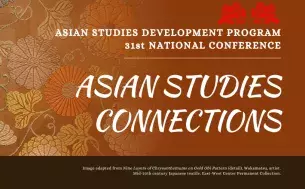Error message
OFFICE/DEPARTMENT
2019 ASDP NATIONAL CONFERENCE
WELLBEING IN ASIAN TRADITIONS OF THOUGHT AND PRACTICE
Music City U.S.A., Nashville, Tennessee
Hosted by ASDP Regional Center: Belmont University
Date: March 7-9, 2019
Venue:
Nashville Airport Marriott
600 Marriott Dr.
Nashville, TN 37214
Tel: 800.770.0555, ask for the 25th Asian Studies block
or Hotel Direct: 615.889.9300
Conference room rate is $179/night + tax
CONFERENCE THEME:
WELLBEING IN ASIAN TRADITIONS OF THOUGHT AND PRACTICE
The 2019 Conference theme Wellbeing in Asian Traditions of Thought and Practice is intended to stimulate interdisciplinary conversations about the meanings-of and means-to wellbeing, expanding the field of wellbeing research beyond the disciplines of psychology, sociology and health sciences to include philosophical, political, economic, religious, artistic, literary and historical engagements with wellbeing. Panels and individual presenters are invited to engage critically with the notion of wellbeing in Asia by exploring such issues such as:
- How has human wellbeing been conceived and measured historically in different Asian contexts? In what ways are these concepts and measures changing?
- How has the struggle to actualize wellbeing revealed itself in the Asian arts (fine arts, performance arts, arts of popular cultures)? For example, how have issues of human wellbeing been engaged in Asian literary and artistic imaginations of utopian and dystopian societies?
- What methods and practices have been used in Asian contexts to construct and implement initiatives and institutions aimed at securing wellbeing?
- How do issues of diversity and equity factor into Asian approaches to conceiving and actualizing wellbeing?
- To what extent are Asian contributions to understanding and realizing human wellbeing addressing issues such as gender, the environment, new digital and social network processes, and tensions between the urban and rural lives people lead?
- What is the role of technology in Asian approaches to securing the conditions for human wellbeing? How are media, the internet, big data and artificial intelligence being understood in relation to issues of personal, social, economic and political wellbeing?
- In what ways are Asian religious and philosophical traditions engaging the challenges of human wellbeing in the contemporary world? Are they generating models that are transferable into other global contexts?
- What inter-regional and international collaborations have Asian countries initiated to work toward human wellbeing?
- What is the relationship between happiness and wellbeing in these Asian societies? How is human happiness conceived of in traditional or contemporary Asian societies?
- Do conceptions of wellbeing in traditional or contemporary Asian societies differ from those in the West? If so, how?
- What are the most significant impediments to wellbeing in contemporary Asian societies?
CALL FOR PAPERS AND PROPOSAL GUIDELINE
ASDP invites proposals for individual papers, panels, poster sessions, or round-table sessions for the 2019 conference.
Please submit a 200 word limit abstract - CLOSED
Paper proposal form here. Complete, scan and email paper proposal to Ronnie Littlejohn.
Panel proposal form here. Complete, scan and email panel proposal to Ronnie Littlejohn.
Early submissions greatly facilitate putting together meaningful panel sessions.
Proposal submission guidelines: (Guidelines) (Flyer)
CONFERENCE SCHEDULE
NASHVILLE ASIA SITES FIELD TRIP ($20, OPTIONAL) LIMITED TO THE FIRST 15
Leader: Dr. Jonathan Thorndike
Director of Honors, Japanese Studies, Belmont University
March 7, 2019, 9:30am - 12:00pm
Meet in the lobby of Nashville Airport Marriott Hotel
**Sign up for the Field Trip here. Registration closed.
No, Nashville is not just music! On this field trip you can visit several of the city's best known Asian sites. Jonathan Thorndike will lead you to three west-side sites in the city. You'll visit these fantastic sites:
- Shōmu-en, Japanese Garden at Cheekwood, a 55-acre botanical garden and art museum located on the historic Cheek estate
- The Hindu Cultural Center of Tennessee and Sri Ganesha Temple, officially opened on April 14, 1985 and designed by Sri MuthiahSthapathi resembling the temple architecture of Chola dynasty (900 CE -1150 CE)
- The Chua Tinh Tam Buddhist Temple, a cultural center for the Vietnamese community in Middle Tennessee.
KEYNOTE SPEAKERS
Dr. Philip J. Ivanhoe
March 8, 2019
Title Talk: Oneness, Spontaneity, and Happiness
Early Daoist and Confucian thinkers hold that human beings are intricately and inextricably intertwined and share a common destiny with other people, creatures, and things. While they disagree about the nature, shape, and implications of our fundamental connection with the rest of the world, it is accurate and revealing to see that they both embrace a concept of oneness with it. This has profound implications for a range of related issues. For example, it means that they tend to see moral failure more in terms of being excessively self-centered, as opposed to simply selfish and that their moral and spiritual ideals involve finding and fulfilling their respective conceptions of oneness. Those who successfully cultivate themselves to accord with and move in harmony with Heavenly patterns and processes experience a profound sense of metaphysical ease and comfort; this explains why they both value spontaneity so highly and why the spontaneity and metaphysical comfort of those who are one with the world lie at the heart of their conceptions of the highest and most sustainable form of happiness.

Philip J. Ivanhoe is Distinguished Chair Professor in the College of Confucian Studies and Eastern Philosophy at Sungkyunkwan University, Seoul, South Korea and director of the newly endowed Sungkyun Institute for Confucian Studies and East Asian Philosophy. Prior to this, he was Chair Professor of East Asian and Comparative Philosophy and Religion at City University of Hong Kong and the founding director of the Center for East Asian and Comparative Philosophy. Known for his many translations of Chinese texts, over 30 authored or edited books, and over 100 articles and book chapters, he publishes and does research in English, Chinese, Japanese, and Korean. Recently, he was the organizer and principle investigator for a three-year project funded by the John Templeton Foundation that resulted in the single authored book, East Asian Conceptions of Oneness, Virtue, and Human Happiness (Oxford, 2017), and the co-edited collection The Oneness Hypothesis: Beyond the Boundaries of the Self (Columbia University Press 2018). He also served as advisor for a multidisciplinary, three-year, $5.1 million project on Happiness and Well-Being: Integrating Research Across the Disciplines based at Saint Louis University.
Dr. Akiko Takenaka
March 9, 2019
Title Talk: Wellbeing in International Relations: Healing National Divides in Postwar Asia Through Memory Studies
The physical, psychological, and political ramifications of the Asia-Pacific War (1931-1945) continue to reverberate throughout Asia. Tensions are most apparent in the political realm, particularly given Japan’s reluctance to embrace its war responsibilities, exacerbating tensions with its neighbors. At stake are the conflicting national memories, with each nation emphasizing its victimhood in the conflicts. Using methodologies derived from memory and trauma studies, I offer a new perspective on the state of international tensions in Asia, with a focus on how Japan came to embrace a position as victim in the Asia-Pacific War despite its role as an aggressor. Understanding the process through which victim identity developed in Japan clarifies the process of memory development in other nations as well; further, it elucidates ways that conflicting and often contradictory national memories might be transformed into shared processes of healing the damaging historical memories as we move into the future.

Akiko Takenaka is Associate Professor and Associate Chair in the Department of History at the University of Kentucky. Her first book Yasukuni Shrine: History, Memory, and Japan’s Unending Postwar (University of Hawaii Press, 2015) is the only book-length work in English that critically examines the controversial war memorial. Its Japanese translation is forthcoming in 2019. She is currently working on her second book manuscript entitled Mothers Against War: Gender, Motherhood, and Grassroots Peace Activism in Postwar Japan. She has published in journals including Gender and History, Verge: Studies in Global Asias, The Public Historian, The Pacific Historical Review, and Review of Japanese Culture and Society, as well as a wide range of edited volumes on topics from war memory and mass dictatorship to aesthetics and visual culture. She is a recipient of numerous awards and fellowships, including Fulbright, Japan Foundation, and Michigan Society of Fellows.
CONFERENCE REGISTRATION
All presenters and attendees must register for the program.
Registration fees:
Early Registration: $275 (through December 7, 2018)
Registration: $300 (after December 7, 2018, extended till February 6, 2019)
Late Registration: $350 (from February 7, 2019)
Student Registration: $125 (ID required at time of registration)
Registration is closed
For payment by check click here to download and print the registration form.
Make your check payable to East-West Center with the notation ASDP National Conference. Mail your payment and form to:
East-West Center
Asian Studies Development Program
Attn: Audrey Minei
1601 East-West Road
Honolulu, Hawai'i 96848-1601
*** Early Registration Deadline is December 7, 2018 ***
HOTEL RESERVATIONS
The conference will be held at:
The Nashville Airport Marriott
600 Marriott Drive
Nashville, TN 37214
Room Rate: $179 per night + tax (single or double occupancy)
Conference attendees must make reservations on or before February 8, 2019, 5:00pm CST to secure the conference rate.
Book your group rate for Asian Studies Development Program National Conference here - CLOSED
2019 ASDP NATIONAL CONFERENCE
WELLBEING IN ASIAN TRADITIONS OF THOUGHT AND PRACTICE
Music City U.S.A., Nashville, Tennessee
Hosted by ASDP Regional Center: Belmont University
Date: March 7-9, 2019
Venue:
Nashville Airport Marriott
600 Marriott Dr.
Nashville, TN 37214
Tel: 800.770.0555, ask for the 25th Asian Studies block
or Hotel Direct: 615.889.9300
Conference room rate is $179/night + tax
CONFERENCE THEME:
WELLBEING IN ASIAN TRADITIONS OF THOUGHT AND PRACTICE
The 2019 Conference theme Wellbeing in Asian Traditions of Thought and Practice is intended to stimulate interdisciplinary conversations about the meanings-of and means-to wellbeing, expanding the field of wellbeing research beyond the disciplines of psychology, sociology and health sciences to include philosophical, political, economic, religious, artistic, literary and historical engagements with wellbeing. Panels and individual presenters are invited to engage critically with the notion of wellbeing in Asia by exploring such issues such as:
- How has human wellbeing been conceived and measured historically in different Asian contexts? In what ways are these concepts and measures changing?
- How has the struggle to actualize wellbeing revealed itself in the Asian arts (fine arts, performance arts, arts of popular cultures)? For example, how have issues of human wellbeing been engaged in Asian literary and artistic imaginations of utopian and dystopian societies?
- What methods and practices have been used in Asian contexts to construct and implement initiatives and institutions aimed at securing wellbeing?
- How do issues of diversity and equity factor into Asian approaches to conceiving and actualizing wellbeing?
- To what extent are Asian contributions to understanding and realizing human wellbeing addressing issues such as gender, the environment, new digital and social network processes, and tensions between the urban and rural lives people lead?
- What is the role of technology in Asian approaches to securing the conditions for human wellbeing? How are media, the internet, big data and artificial intelligence being understood in relation to issues of personal, social, economic and political wellbeing?
- In what ways are Asian religious and philosophical traditions engaging the challenges of human wellbeing in the contemporary world? Are they generating models that are transferable into other global contexts?
- What inter-regional and international collaborations have Asian countries initiated to work toward human wellbeing?
- What is the relationship between happiness and wellbeing in these Asian societies? How is human happiness conceived of in traditional or contemporary Asian societies?
- Do conceptions of wellbeing in traditional or contemporary Asian societies differ from those in the West? If so, how?
- What are the most significant impediments to wellbeing in contemporary Asian societies?
CALL FOR PAPERS AND PROPOSAL GUIDELINE
ASDP invites proposals for individual papers, panels, poster sessions, or round-table sessions for the 2019 conference.
Please submit a 200 word limit abstract - CLOSED
Paper proposal form here. Complete, scan and email paper proposal to Ronnie Littlejohn.
Panel proposal form here. Complete, scan and email panel proposal to Ronnie Littlejohn.
Early submissions greatly facilitate putting together meaningful panel sessions.
Proposal submission guidelines: (Guidelines) (Flyer)
CONFERENCE SCHEDULE
NASHVILLE ASIA SITES FIELD TRIP ($20, OPTIONAL) LIMITED TO THE FIRST 15
Leader: Dr. Jonathan Thorndike
Director of Honors, Japanese Studies, Belmont University
March 7, 2019, 9:30am - 12:00pm
Meet in the lobby of Nashville Airport Marriott Hotel
**Sign up for the Field Trip here. Registration closed.
No, Nashville is not just music! On this field trip you can visit several of the city's best known Asian sites. Jonathan Thorndike will lead you to three west-side sites in the city. You'll visit these fantastic sites:
- Shōmu-en, Japanese Garden at Cheekwood, a 55-acre botanical garden and art museum located on the historic Cheek estate
- The Hindu Cultural Center of Tennessee and Sri Ganesha Temple, officially opened on April 14, 1985 and designed by Sri MuthiahSthapathi resembling the temple architecture of Chola dynasty (900 CE -1150 CE)
- The Chua Tinh Tam Buddhist Temple, a cultural center for the Vietnamese community in Middle Tennessee.
KEYNOTE SPEAKERS
Dr. Philip J. Ivanhoe
March 8, 2019
Title Talk: Oneness, Spontaneity, and Happiness
Early Daoist and Confucian thinkers hold that human beings are intricately and inextricably intertwined and share a common destiny with other people, creatures, and things. While they disagree about the nature, shape, and implications of our fundamental connection with the rest of the world, it is accurate and revealing to see that they both embrace a concept of oneness with it. This has profound implications for a range of related issues. For example, it means that they tend to see moral failure more in terms of being excessively self-centered, as opposed to simply selfish and that their moral and spiritual ideals involve finding and fulfilling their respective conceptions of oneness. Those who successfully cultivate themselves to accord with and move in harmony with Heavenly patterns and processes experience a profound sense of metaphysical ease and comfort; this explains why they both value spontaneity so highly and why the spontaneity and metaphysical comfort of those who are one with the world lie at the heart of their conceptions of the highest and most sustainable form of happiness.

Philip J. Ivanhoe is Distinguished Chair Professor in the College of Confucian Studies and Eastern Philosophy at Sungkyunkwan University, Seoul, South Korea and director of the newly endowed Sungkyun Institute for Confucian Studies and East Asian Philosophy. Prior to this, he was Chair Professor of East Asian and Comparative Philosophy and Religion at City University of Hong Kong and the founding director of the Center for East Asian and Comparative Philosophy. Known for his many translations of Chinese texts, over 30 authored or edited books, and over 100 articles and book chapters, he publishes and does research in English, Chinese, Japanese, and Korean. Recently, he was the organizer and principle investigator for a three-year project funded by the John Templeton Foundation that resulted in the single authored book, East Asian Conceptions of Oneness, Virtue, and Human Happiness (Oxford, 2017), and the co-edited collection The Oneness Hypothesis: Beyond the Boundaries of the Self (Columbia University Press 2018). He also served as advisor for a multidisciplinary, three-year, $5.1 million project on Happiness and Well-Being: Integrating Research Across the Disciplines based at Saint Louis University.
Dr. Akiko Takenaka
March 9, 2019
Title Talk: Wellbeing in International Relations: Healing National Divides in Postwar Asia Through Memory Studies
The physical, psychological, and political ramifications of the Asia-Pacific War (1931-1945) continue to reverberate throughout Asia. Tensions are most apparent in the political realm, particularly given Japan’s reluctance to embrace its war responsibilities, exacerbating tensions with its neighbors. At stake are the conflicting national memories, with each nation emphasizing its victimhood in the conflicts. Using methodologies derived from memory and trauma studies, I offer a new perspective on the state of international tensions in Asia, with a focus on how Japan came to embrace a position as victim in the Asia-Pacific War despite its role as an aggressor. Understanding the process through which victim identity developed in Japan clarifies the process of memory development in other nations as well; further, it elucidates ways that conflicting and often contradictory national memories might be transformed into shared processes of healing the damaging historical memories as we move into the future.

Akiko Takenaka is Associate Professor and Associate Chair in the Department of History at the University of Kentucky. Her first book Yasukuni Shrine: History, Memory, and Japan’s Unending Postwar (University of Hawaii Press, 2015) is the only book-length work in English that critically examines the controversial war memorial. Its Japanese translation is forthcoming in 2019. She is currently working on her second book manuscript entitled Mothers Against War: Gender, Motherhood, and Grassroots Peace Activism in Postwar Japan. She has published in journals including Gender and History, Verge: Studies in Global Asias, The Public Historian, The Pacific Historical Review, and Review of Japanese Culture and Society, as well as a wide range of edited volumes on topics from war memory and mass dictatorship to aesthetics and visual culture. She is a recipient of numerous awards and fellowships, including Fulbright, Japan Foundation, and Michigan Society of Fellows.
CONFERENCE REGISTRATION
All presenters and attendees must register for the program.
Registration fees:
Early Registration: $275 (through December 7, 2018)
Registration: $300 (after December 7, 2018, extended till February 6, 2019)
Late Registration: $350 (from February 7, 2019)
Student Registration: $125 (ID required at time of registration)
Registration is closed
For payment by check click here to download and print the registration form.
Make your check payable to East-West Center with the notation ASDP National Conference. Mail your payment and form to:
East-West Center
Asian Studies Development Program
Attn: Audrey Minei
1601 East-West Road
Honolulu, Hawai'i 96848-1601
*** Early Registration Deadline is December 7, 2018 ***
HOTEL RESERVATIONS
The conference will be held at:
The Nashville Airport Marriott
600 Marriott Drive
Nashville, TN 37214
Room Rate: $179 per night + tax (single or double occupancy)
Conference attendees must make reservations on or before February 8, 2019, 5:00pm CST to secure the conference rate.
Book your group rate for Asian Studies Development Program National Conference here - CLOSED








